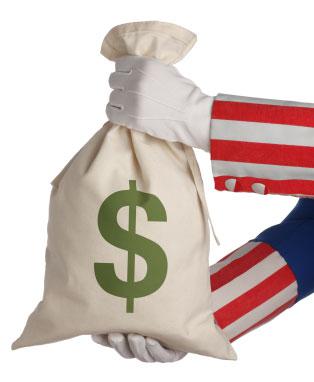
Photo courtesy of iStockphoto.
Money is the primary influence over virtually every aspect of political power in America. Whether it is public appropriations using tax revenues, or private spending on campaigns, lobbying and media, government action, and oftentimes inaction, depends on financing. Two out of three political races are won by the candidate who spends the most money. Public opinion shows that most Americans believe that there is too much money in campaigns and that it gives at least the appearance of corruption (Dye, Macmanus 172-173). Although the money in campaigns is often the focus of attention, its power over government is subordinate. Both the growth in nominal state power and the growth in the federal government’s relative supremacy have been substantially determined by money.
State and community governments are responsible for major swaths of public policy, like education, law enforcement, transportation, and the public’s health, safety and welfare (Dye, Macmanus 20-24). The power of state governments, with respect to performing their public duties, is largely controlled by spending power. Even though popular governors can use the public’s favor to influence the agenda (Dye, Macmanus 253), money cannot be collected or appropriated without state legislature approval, giving state lawmakers immense control over the public policy agenda (Dye, Macmanus 185). The growth of state revenues from federal grants-in-aid and institutionalized state income and sales taxes has caused many former biennial legislatures to double their time spent on the job. The number of state governments meeting annually to construct budgets has increased from six to thirty since 1940 (Snell). The greater the revenue earned by the states, the greater the proliferation of state government programs, and thus political power.
Even though the power of state governments has grown, the federal government has also shifted the balance of power in its favor. The Supremacy Clause indicates that state law is ultimately subordinate to the US Constitution (Dye, Macmanus 36-37), and the power of the federal government to tax and spend was established in Article I. However, the Sixteenth Amendment, ratified in 1913, gave the federal government the ability to set up a progressive income tax on individuals and businesses. Through grants-in-aid the Congress has the ability to redistribute wealth, often from urban to rural states, and it can use the power of the purse to exercise political influence over the states, like when it threatened to withhold highway money in order to force the states to increase the drinking age to 21 (Dye, Macmanus 85-88). The availability of funds to allocate has increased the influence of the federal government by making the states more dependent on it for their fiscal power.
Money is the primary determinant of political power, but it is not absolute. State tax and expenditure limit (TEL) laws exist to one extent in thirty states, but Colorado, Oregon and Oklahoma have hybrids. Oregon’s TELs limit revenue and spending to inflation of population. Colorado also requires voter approval for all tax increases, which is the most restrictive type of revenue limitation device (Waisanen). States that chart their own territory with creative legislation like TELs act as laboratories of democracy, and success or failure of these tax policy experiments determines whether they spread to other states, or to the federal government. Back in 2009, advertising had bombarded Washington voters about I-1033, which was an attempt to use the power of direct democracy to pass TEL legislation. Ads opposing I-1033 pointed to the budgetary problems caused by Colorado’s restrictive TELs, which I-1033 is similar to. Washington voters rejected this initiative by a 10% margin, likely because the recessionary effects have already forced budget cuts and government layoffs (Woodward). Not all voters are for limiting state government power through TELs if they perceive government power as necessary for receiving needed public services.
I have always assumed politics was hopelessly corrupted by money. Campaign finance laws have failed to keep money from influencing elections, and have just shifted the money to special interest groups (Dye, Macmanus 177). The 2008 financial crisis that resulted in the bailouts of several firms, including many large banks, has increased federal power relative to the private sector. Many are fearful of where the increase in federal fiscal authority could take the country, and it is hard to miss the anxiety that some have about President Obama’s intentions. I am confident that if a majority of Americans begin to fear government power that they will vote out the offending politicians regardless of the money spent. What worries me is that even when we do vote politicians out of office we are really just reelecting new middle managers, and America’s true agenda setters will still be the same moneyed interests. In fact, I think that this problem would be worse with a President Romney.
Jared Roy Endicott
Dye, Thomas R., and Susan A. Macmanus. Politics in State and Local Communities. Thirteenth Ed. Upper Saddle River, NJ: Pearson Prentice Hall, 2009. Print.
Snell, Richard K. Annual and Biennial Budgeting: The Experience of State Governments. National Conference of State Legislatures, Apr. 2009. Web. 10 Oct. 2009.
Waisanen, Bert. State Tax and Expenditure Limits-2008. National Conference of State Legislatures, 12 Dec. 2008. Web. 12 Oct. 2009.
Woodward, Curt. “Revenue Cap Initiative Loses Badly in Wash. State.. Seattlepi.com , 4 Nov. 2009. Web. 5 Nov. 2009.

